
The Bottom Line
Introduction, Specifications, and Pricing
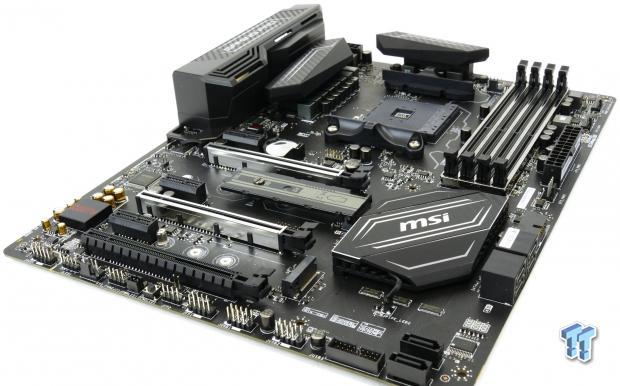
Many of you had requested that we review the X370 Gaming Pro Carbon, and today we deliver. The X370 Gaming Pro Carbon is one of MSI's top Performance series motherboards for the X370 chipset. It offers pretty aesthetics and top-notch features that you might not find on MSI's lower-end X370 and B350 motherboards such as dual M.2 slots.
MSI's X370 GAMING PRO CARBON's color theme is a popular one, black with hints of silver and white, and allows easy matching. It has many integrated RGB LEDs, and you can change the motherboard's color theme to match that of the rest of your system, and that is one reason it's a popular motherboard.
Without further delay, let us look at how MSI is doing in the high-end X370 market.
Specifications

The X370 GAMING PRO CARBON features 32Gb/s M.2, 20Gb/s M.2, USB 3.1, high-end audio, USB 3.1, USB 3.0, SATA6Gb/s, and SLI/CrossFireX support.
Pricing
The X370 GAMING PRO CARBON costs $179.99.
Packaging and X370 GAMING PRO CARBON Overview
Packaging and Overview
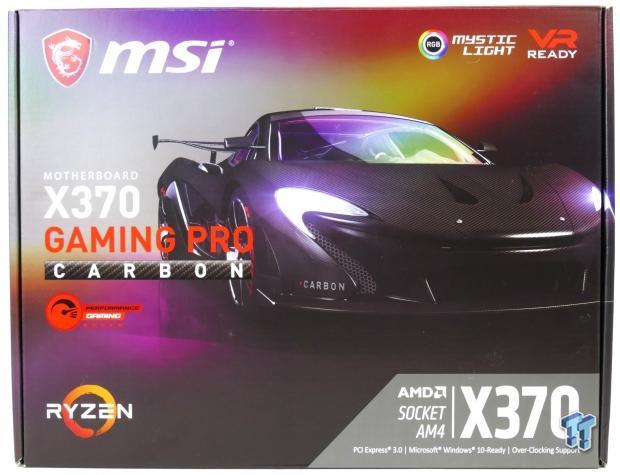
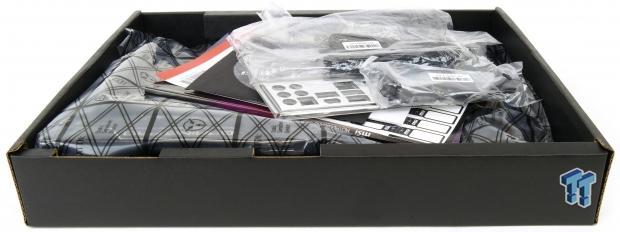
The motherboard's box is colorful and features a racecar, the same one on the BIOS splash screen. Packaging is the same as we have seen with other MSI X370 products, your motherboard should arrive unharmed.
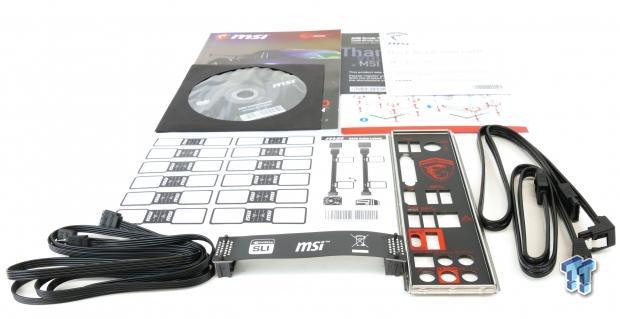
The accessory package includes two SATA6Gb/s cables, RGB LED extension Y-cable, IO panel, SLI bridge, two SATA6Gb/s cables, cable label stickers, installation materials, manual, and driver DVD.
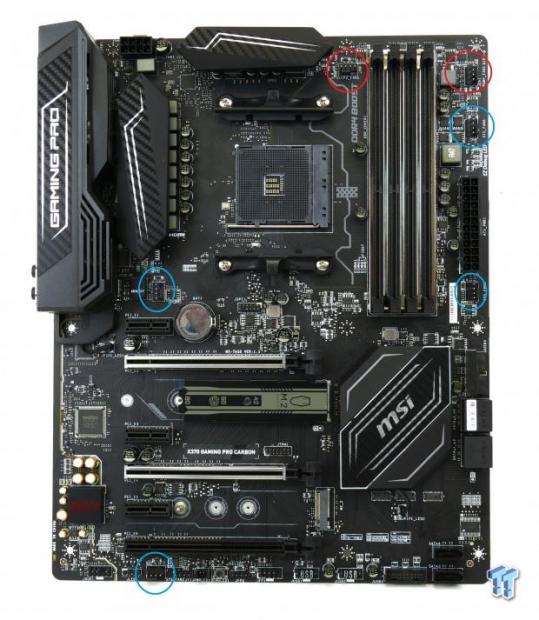
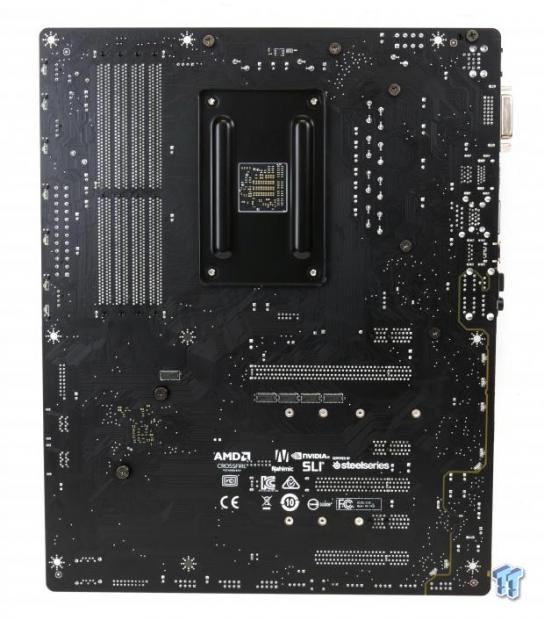
MSI offers six fan headers on this motherboard, one more than on the X370 SLI PLUS. All headers support DC or PWM mode operation, but some headers are PWM by default, and some are DC mode, you need to go into the UEFI to change their mode. The two headers circled in red are in PWM mode by default while the four circled in blue are DC mode by default.
The motherboard has black heat sinks with hints of white on carbon fiber panels, both PCI-E slots are metal reinforced, and the memory DIMMs have a metal shroud around them. The motherboard has very few components on the back, just a few PCI-E quick switches.
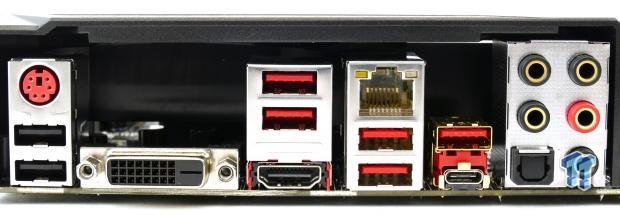
The rear IO panel features PS/2 Keyboard/Mouse, four USB 3.0 ports, two USB 2.0 ports, USB 3.1 type-A, USB 3.1 type-C, DVI, HDMI, Gbit LAN, and 7.1 gold plated audio ports with S/PDIF.
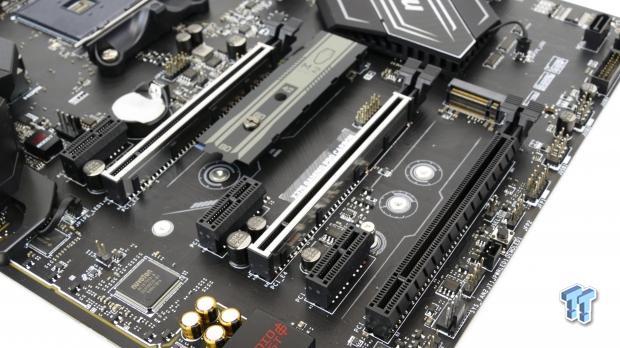
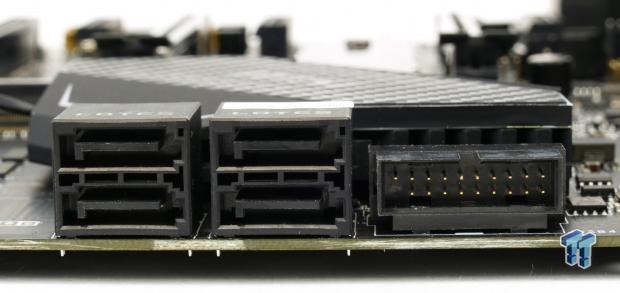
The PCI-E layout is very similar to that of other X370 motherboards. The first two x16 slots operate at x16/x0 or x8/x8. The last PCI-E x16 slot is wired x4 PCI-E 2.0 to the PCH and shares its bandwidth with the second M.2 slot. There are also three PCI-E 2.0 x1 slots. Four SATA ports are right angled as is one of the USB 3.0 internal headers.
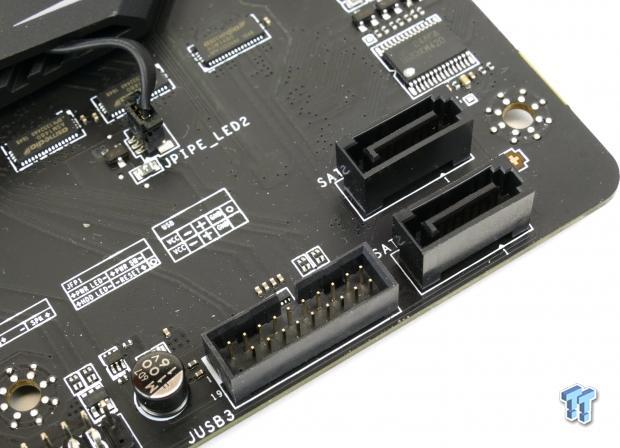
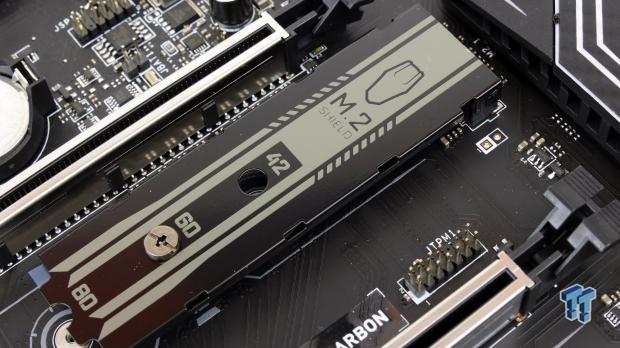
The motherboard also has two straight SATA6Gb/s ports to the right of a USB 3.0 internal header. The 32Gb/s slot gets an M.2 Shield.
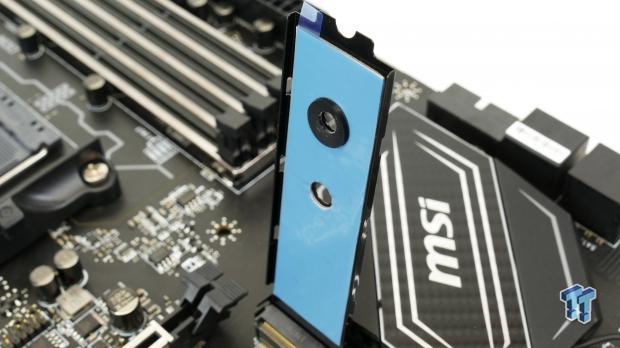
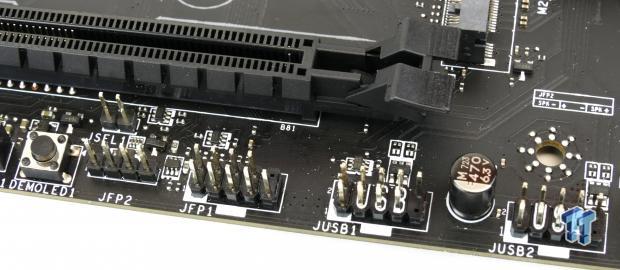
The M.2 Shield uses a heat pad to transfer heat from the M.2 drive to the metal on the shield. It is much more useful for single sided drives than double-sided ones. The motherboard features two USB 2.0 internal headers to the right of the front panel headers. The JSEL1 jumper is used to enable the DEMOLED1 button's function. Pressing the button will change the RGB LED effects.
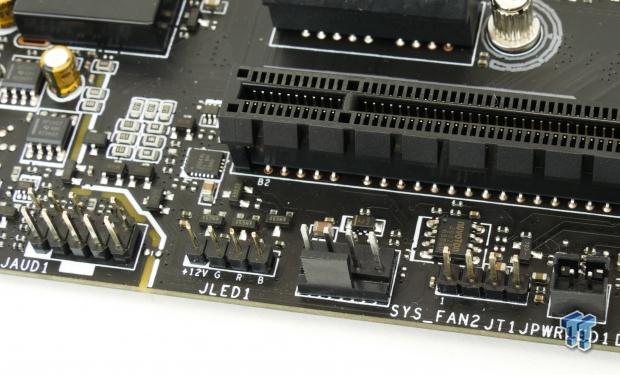
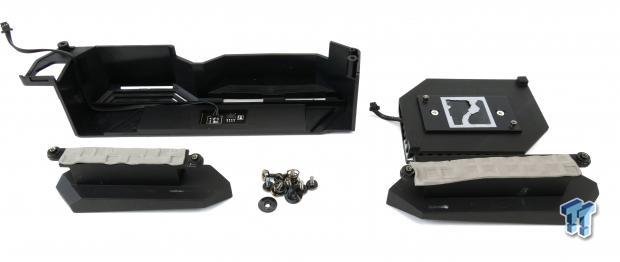
The motherboard features a single RGB LED header at the bottom of the motherboard. All of the heat sinks and the shield are screwed into the motherboard.
MSI X370 GAMING PRO CARBON Circuit Analysis
Circuit Analysis
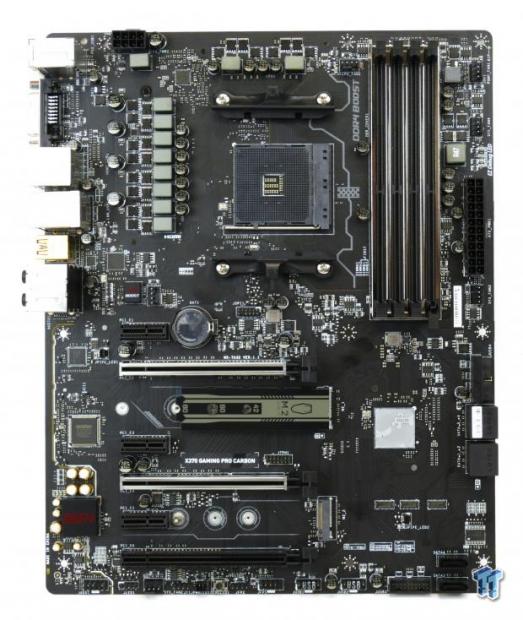
The X370 GAMING PRO CARBON reveals some of its secrets once the heat sinks and shields are removed.
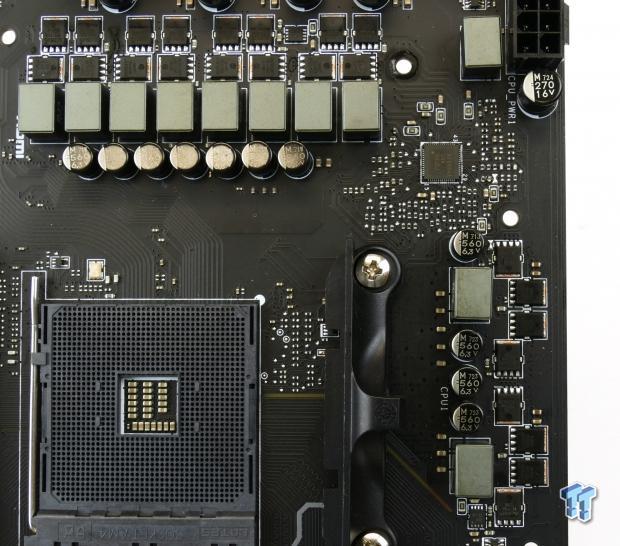
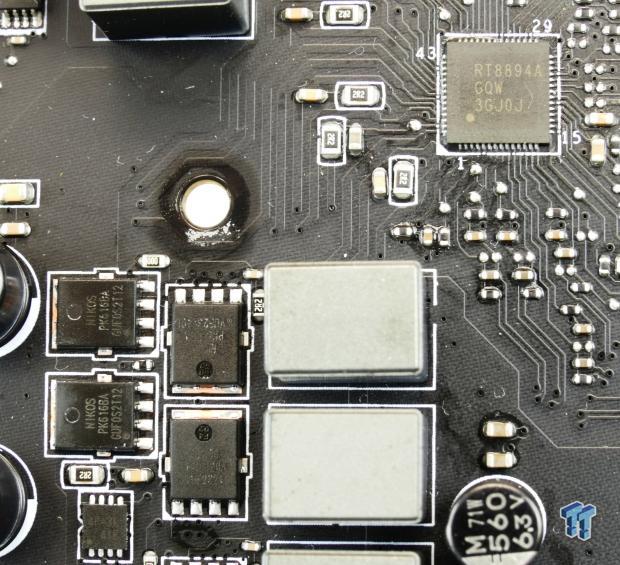
The VRM is in an 8+2 phase configuration, and it's actually the same exact VRM I found on the X370 SLI PLUS (different filter components). The Richtek RT8894A is the 4+2 phase PWM controller used to control the core and SOC rails. A Richtek RT9624F complements the three integrated ones from the PWM, and two more are used to drive the SOC rail.
Nikos PK616BA and PK632BA PowerPAK MOSFETs are used just like on the other X370 MSI motherboards we have reviewed. To get eight phases from the four, VRM components are doubled up on to each driver channel.
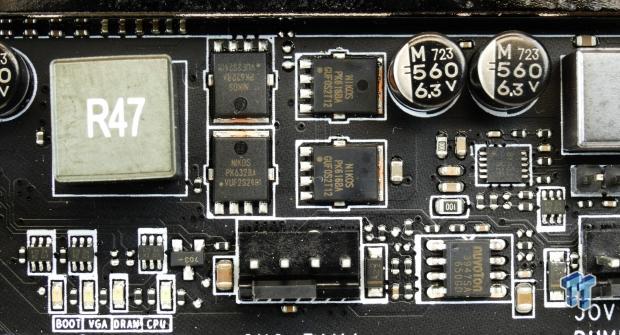
The memory VRM is a large single phase controlled by a Richtek RT8125E; it uses double the number of MOSFETs you find per phase.
MSI X370 GAMING PRO CARBON Circuit Analysis Continued
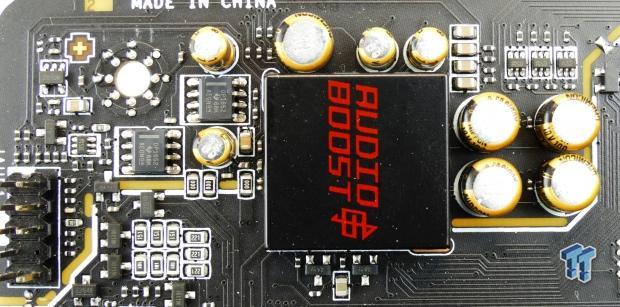
The audio section on this motherboard is very much upgraded over other MSI motherboards I have reviewed. It uses the ALC1220 as well as two Texas Instruments OP1652 amplifiers. Nichicon Gold series capacitors and a physical divide of the PCB help improve audio quality.
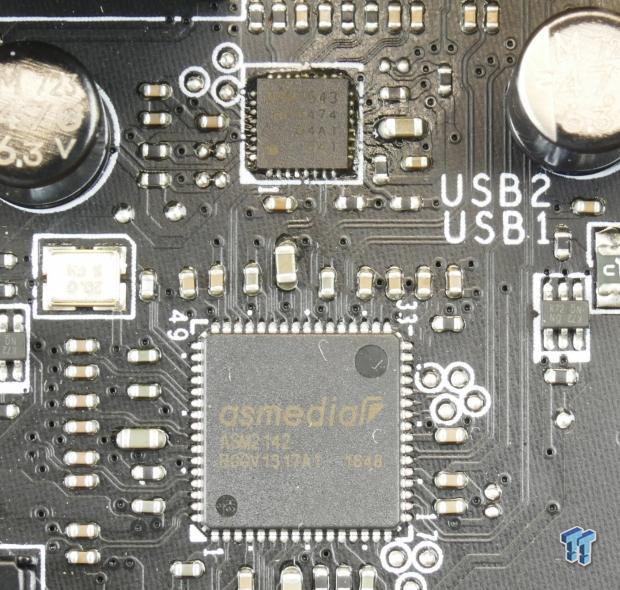
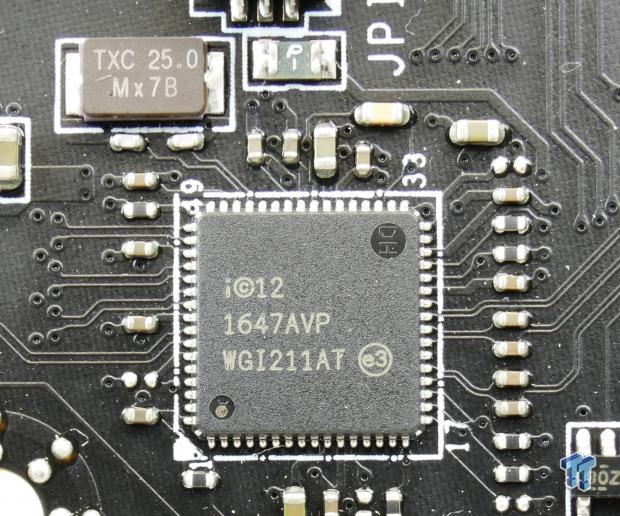
Instead of using AMD's USB 3.1 from the X370 chipset, MSI uses the ASMedia ASM2142 USB 3.1 controller and an ASM1543 type-C switch chip. The Gbit LAN uses an Intel WGI211AT controller.
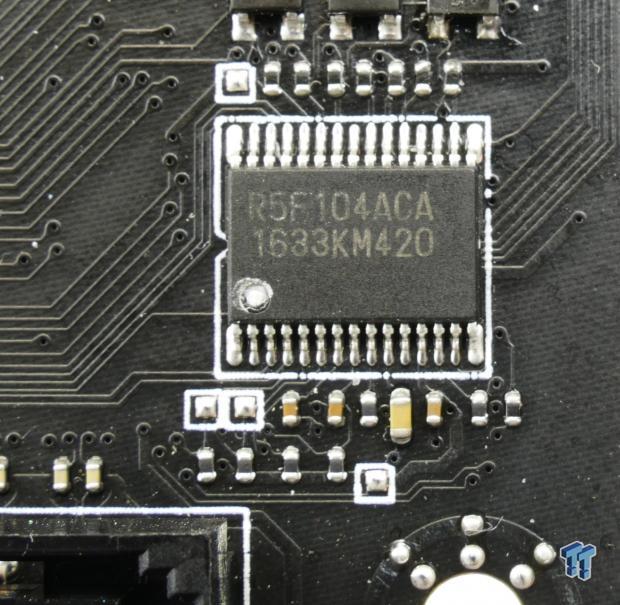
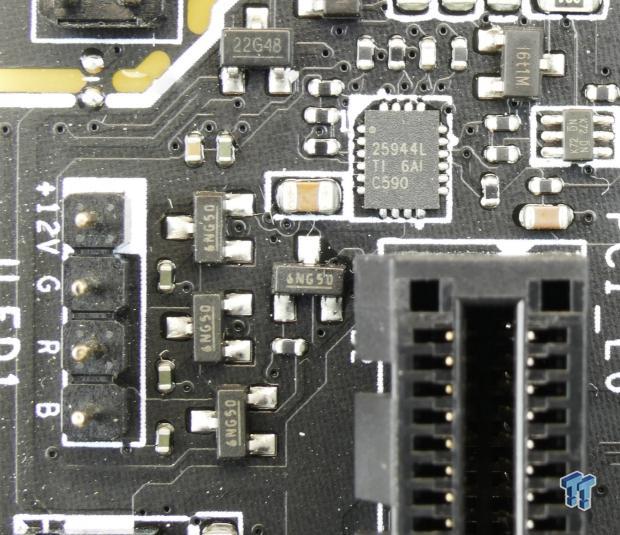
A Renesas R5F104ACA microcontroller is used to control the RGB LED effects and features. A Texas Instruments eFuse is used to protect the motherboard from reverse polarity insertion of the RGB LED header.
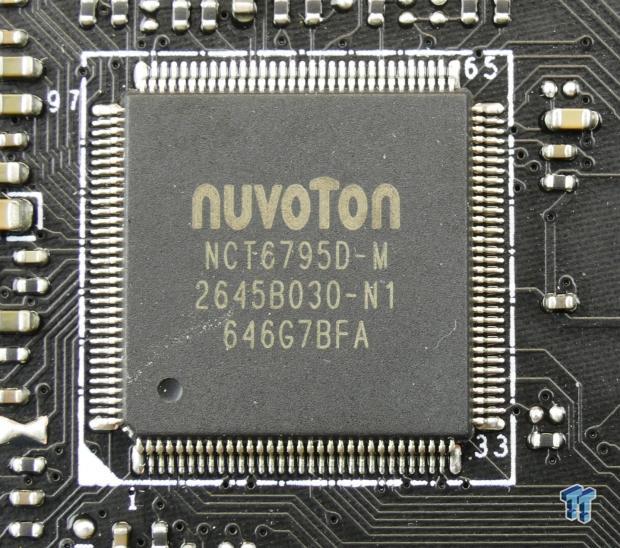
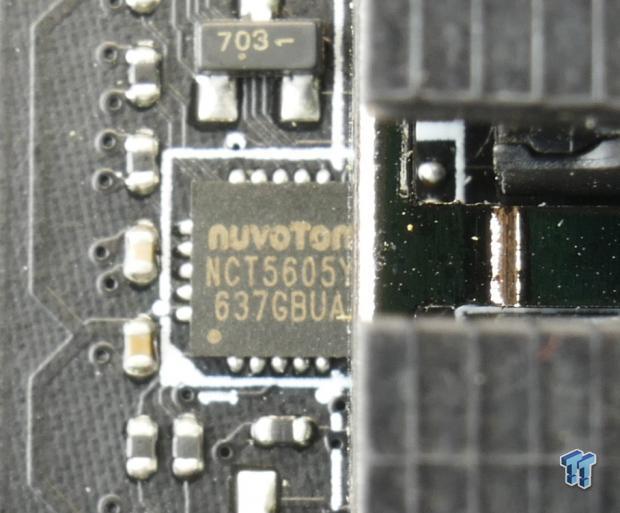
The main SuperIO is the NCT6795D, and it offers fan control, system monitoring, and the PS/2 on the rear IO. An NCT5605Y is used to provide extra fan control.
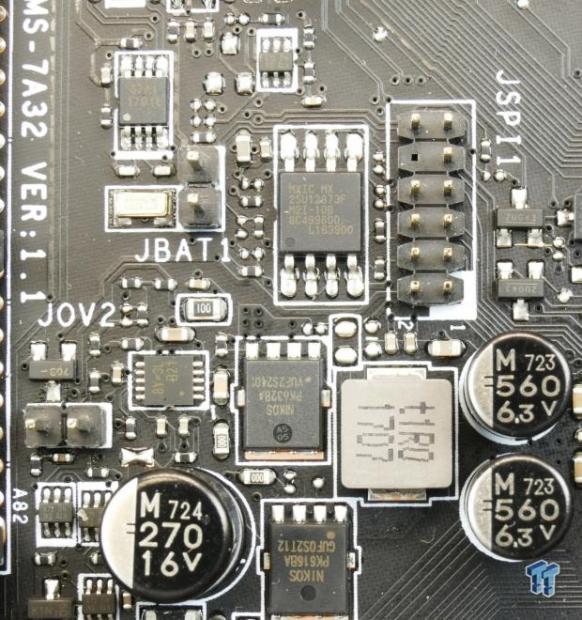
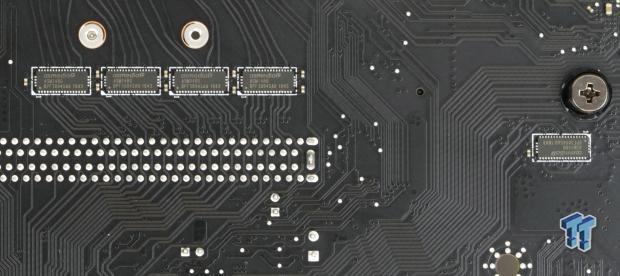
The motherboard has a single 128Mbit/16MB BIOS ROM. Multiple ASMedia 1480 quick switches switch PCI-E and SATA bandwidth between different devices.
BIOS and Software
BIOS
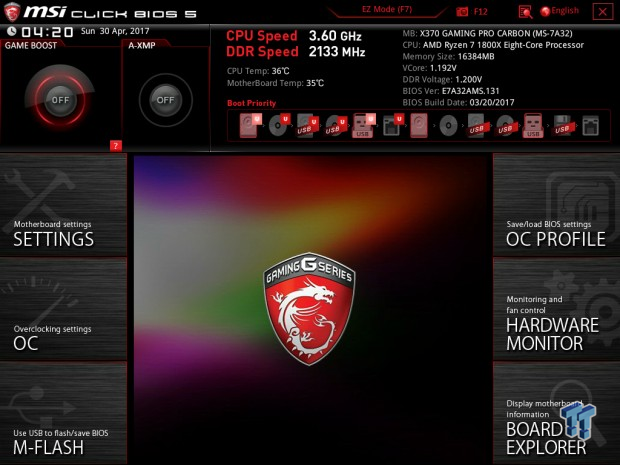
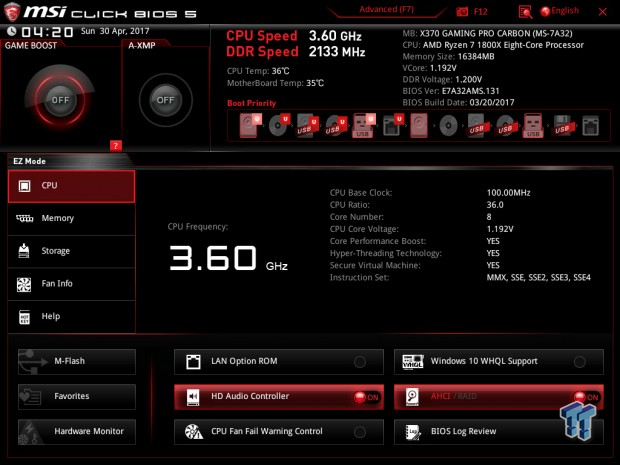
MSI's UEFI for the X370 GAMING PRO CARBON is very similar to the rest of MSI's X370 motherboards, but we do get a color upgrade. Overclocking settings and other advanced system settings are easy to navigate through and understand. AMD has done a good job of standardizing most everything when it comes to overclocking the CPU, and MSI's customizations are decent. Fan control is simple, and as I have mentioned before, I like the Hardware Monitor GUI.
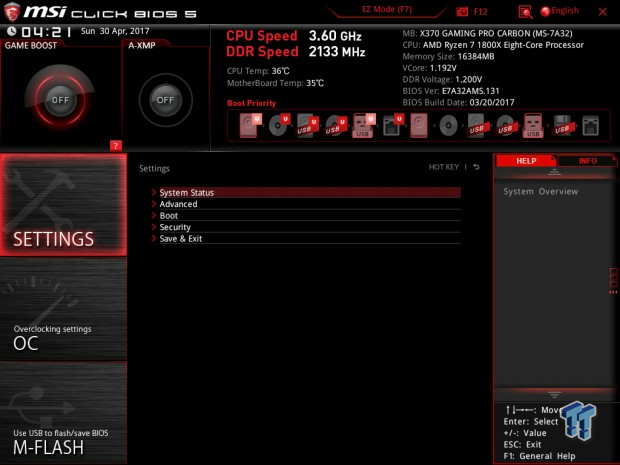
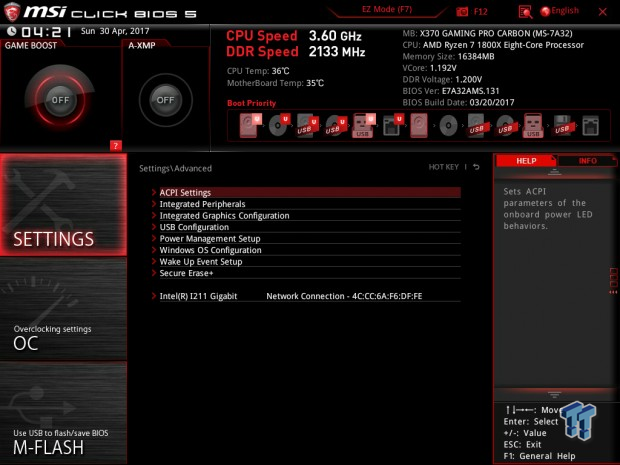
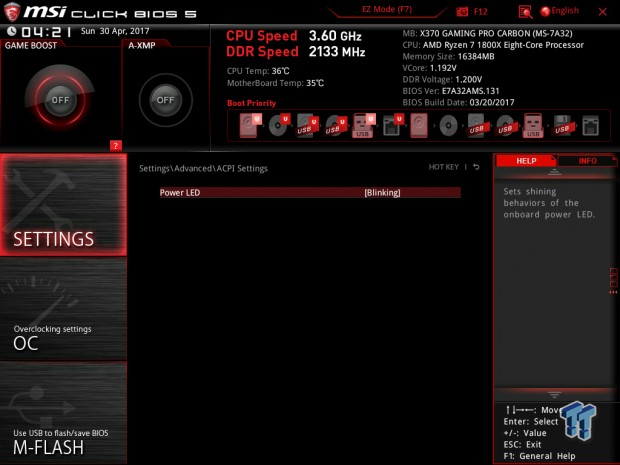
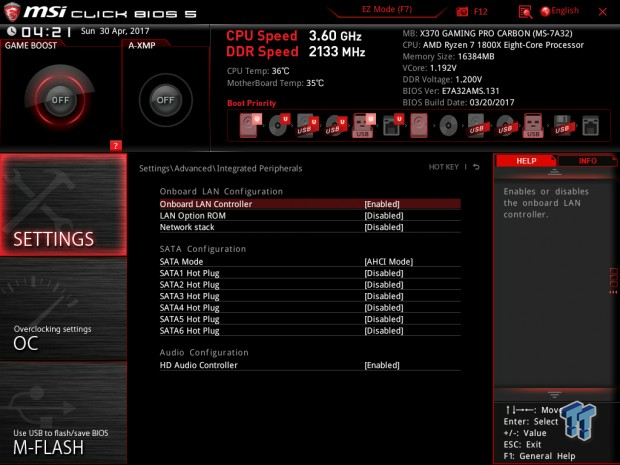
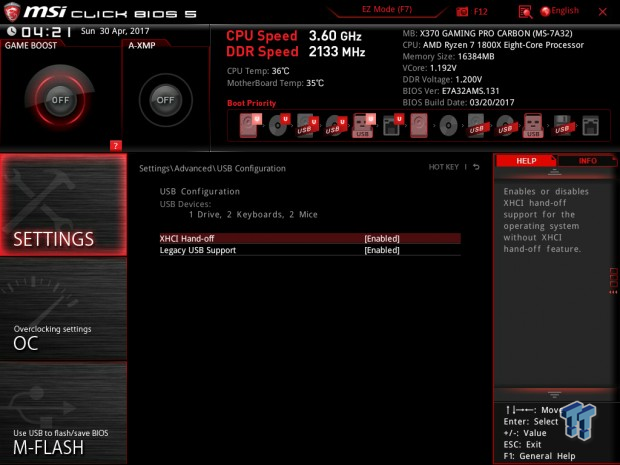
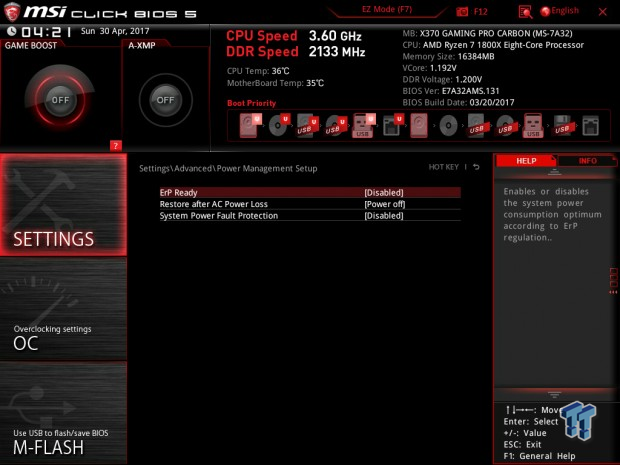
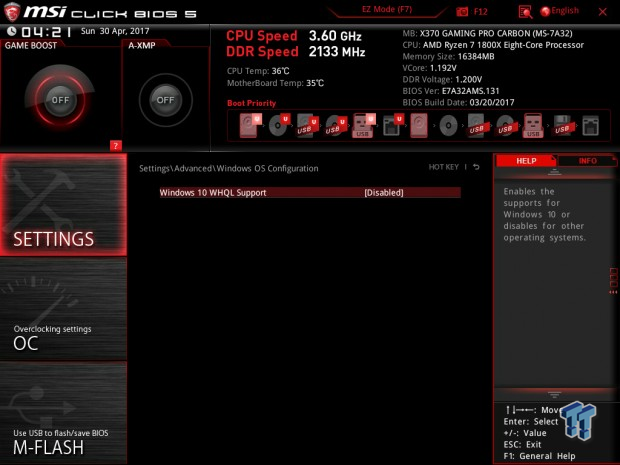
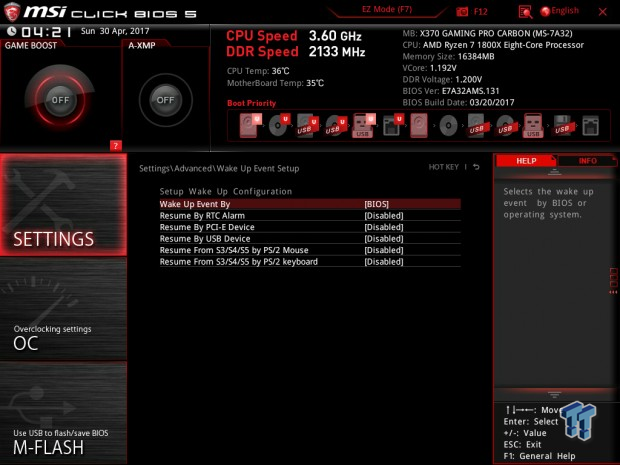
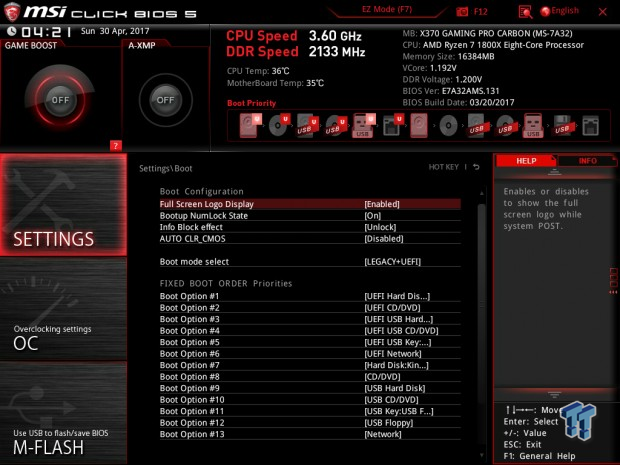
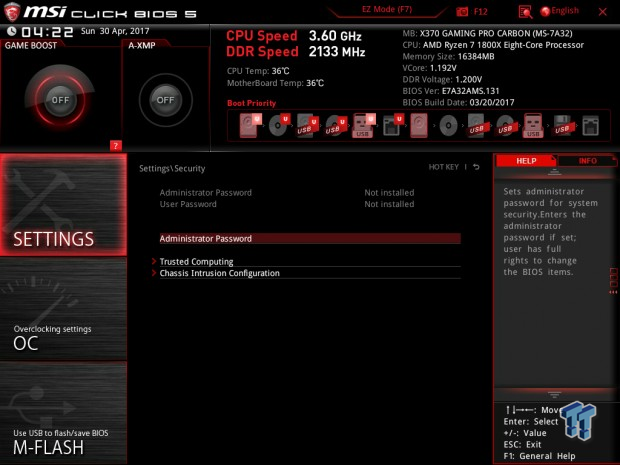
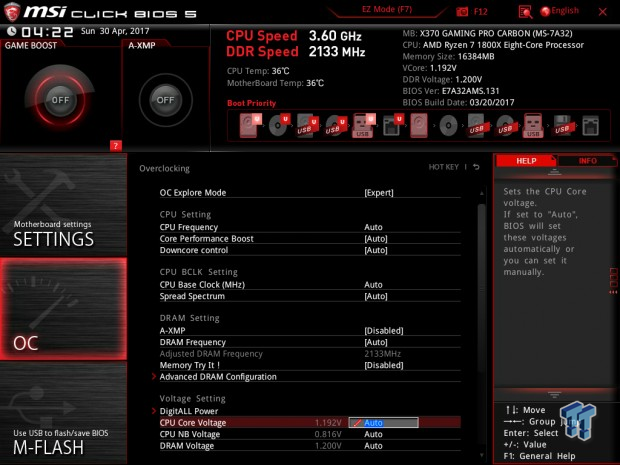
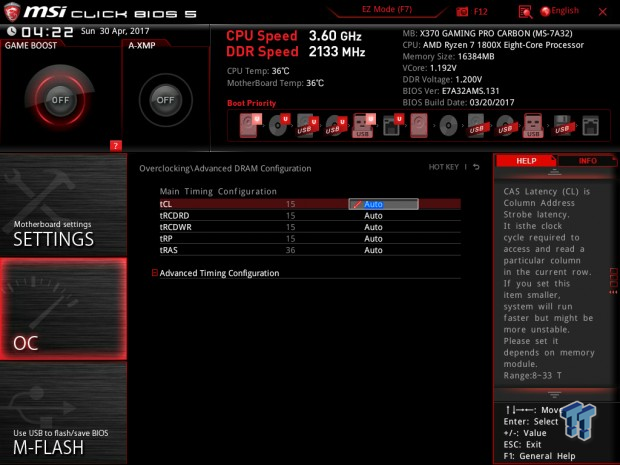
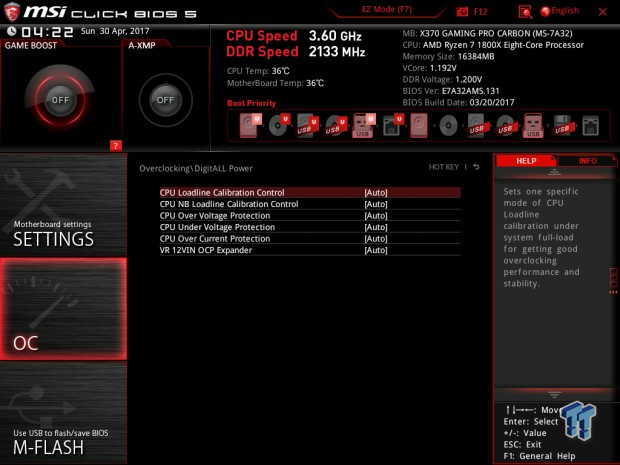
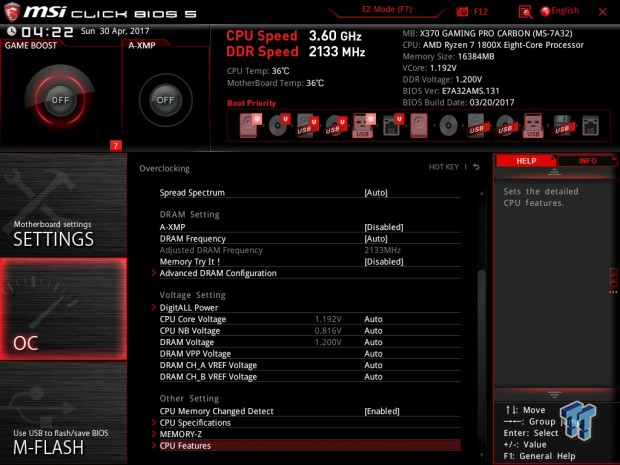
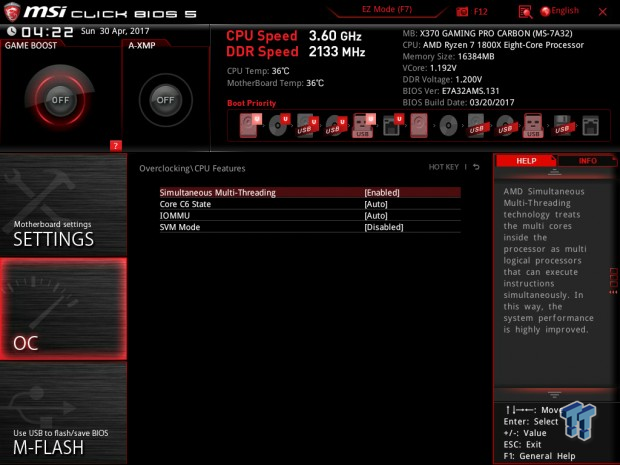
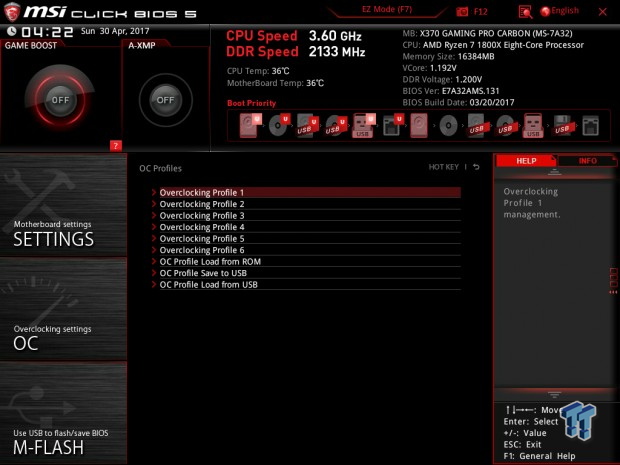
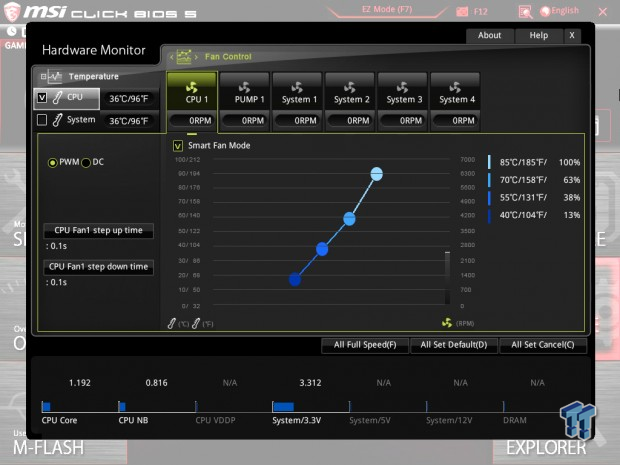
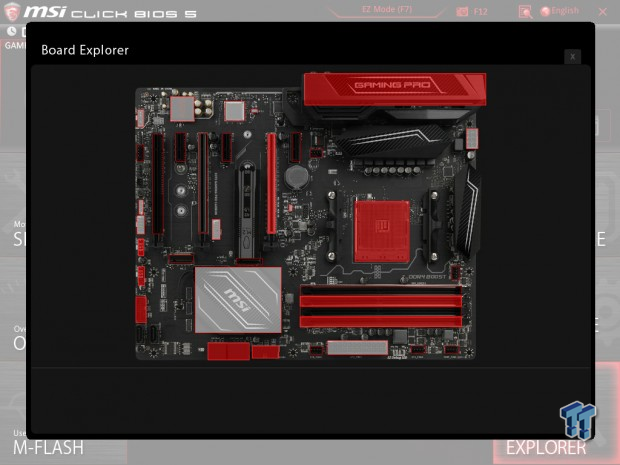
Software
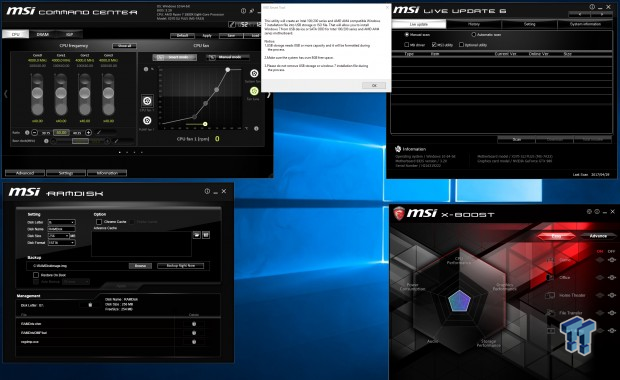
MSI's software suite includes MSI Command Center, Smart Tool (to make Win7 work), Live Update 6, X-Boost, and RAMDISK.
Test System Setup
Steven's Motherboard Test System Specifications
- Motherboard: MSI X370 GAMING PRO CARBON
- CPU: AMD Ryzen 7 1800X
- Cooler: Corsair H110i - Buy from Amazon
- Memory: Corsair Vengeance (2x8GB) 3000MHz
- Video Card: NVIDIA GeForce GTX 980 - Buy from Amazon / Read our review
- Storage - Boot Drive: Kingston Predator 240GB
- Storage - SATA6G Drive: Micron Generic 240GB
- Storage - USB Drive: Corsair Voyager GS 64GB - Buy from Amazon / Read our review
- Case: Corsair Obsidian 900D - Buy from Amazon / Read our review
- Power Supply: Corsair HX1000 - Buy from Amazon / Read our review
- OS: Microsoft Windows 10 - Buy from Amazon
- Monitor: ASUS PA328 ProArt 32" 4K - Buy from Amazon
- Keyboard: Corsair K70 LUX - Buy from Amazon
- Mouse: Corsair M65 PRO RGB - Buy from Amazon / Read our review
- Headset: Corsair VOID RGB Wireless - Buy from Amazon / Read our review
- Network: ASUS XG-U2008 10Gbit Switch
- BIOS: 1.40
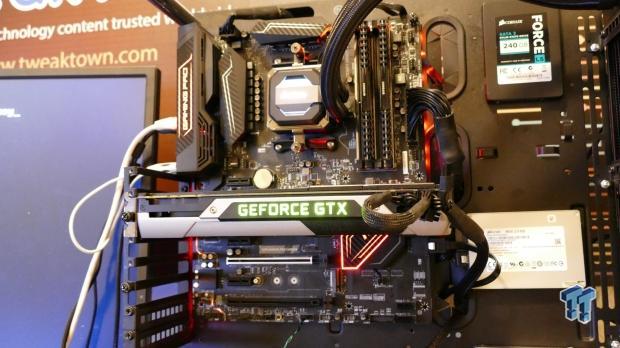
The X370 GAMING PRO CARBON is a really sleek looking motherboard; I actually dig the carbon fiber.
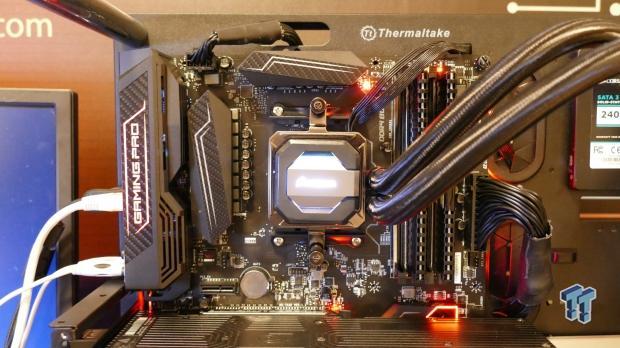
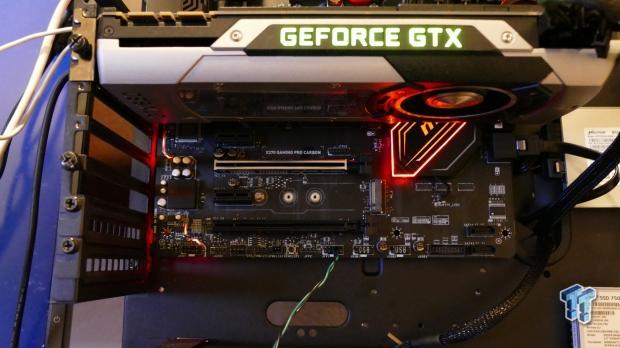
The RGB LEDs provide the ability to change your color theme to what you want, all depending on your build's aesthetic requirements.
Overclocking
Overclocking Results
CPU Overclocking
AMD's Ryzen platform is quite new; AMD and its partners are working very hard on fixing issues and getting things to work across the board. The CPU also doesn't validate that much higher than its maximum stable frequency. Memory overclocking is topped at 3200MHz on most motherboards, and bus adjustment is also very tricky. Don't get me wrong, the CPU can overclock, mine does 4.0GHz, and the best I can get a kit is to 3000MHz. I will go through and tell you exactly what I did to achieve my maximum stable overclock, and as AMD's ecosystem of compatible memory kits becomes larger, I will add in a memory compatibility section.
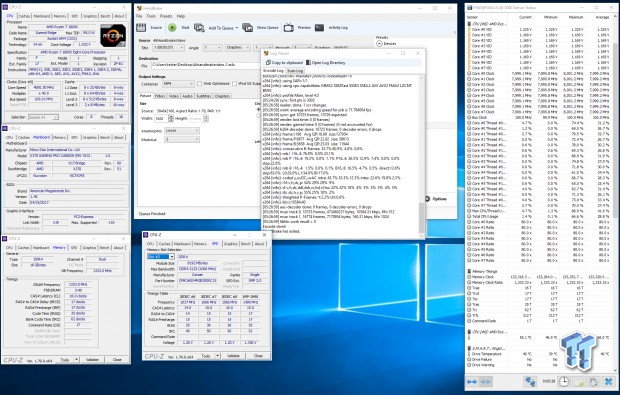
The X370 GAMING PRO CARBON allows for simple and easy overclocking. You just need to type in the CPU frequency you want, I used 4000, and then you can set the VCore manually or let the motherboard chose the VCore. I allowed the motherboard to choose it, and it chose 1.35v, just like on other motherboards. I was able to get the memory to 2666MHz, which is lower than the 2933MHz I used to be able to attain, but I have a feeling it has to do with some changes AMD is making to the AEGIS code to improve overall compatibility. I do expect memory overclocking to improve in the future.
CPU, Memory, and System Benchmarks
CINEBENCH R15
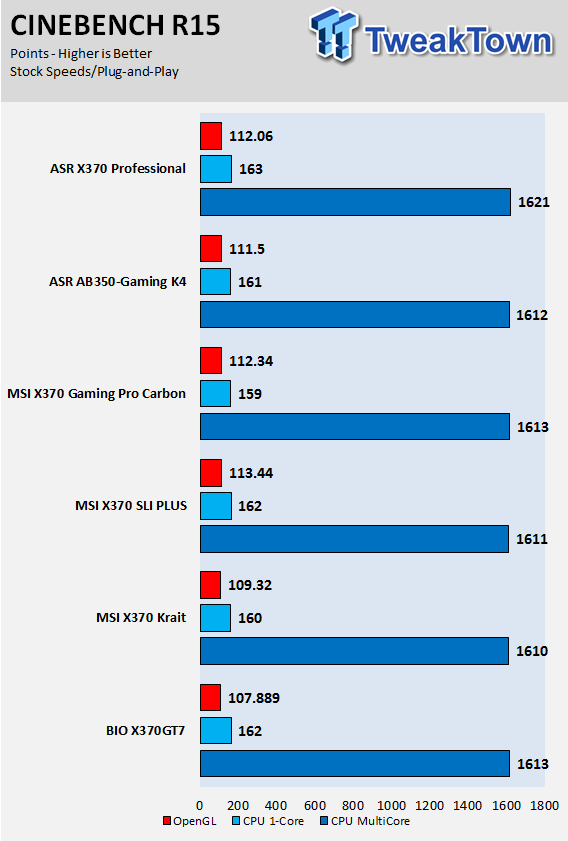
wPrime
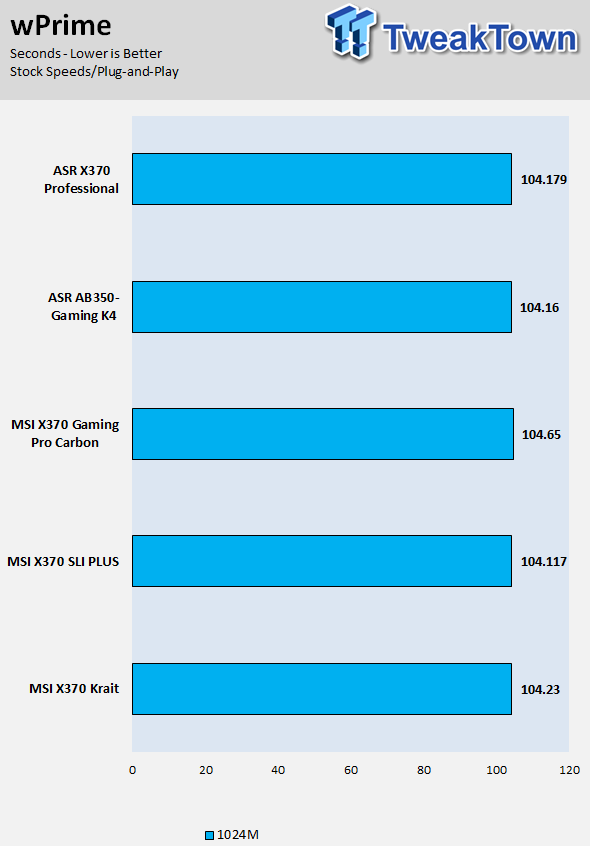
AIDA64 FPU
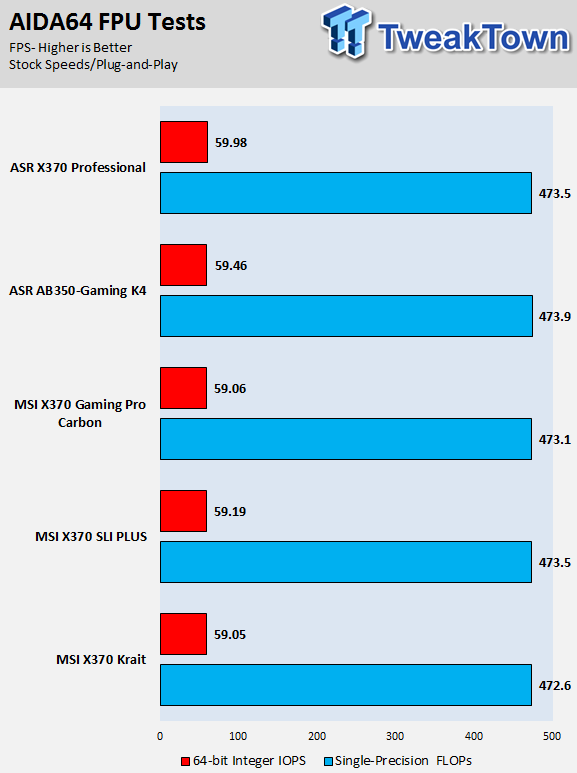
AIDA64 Memory
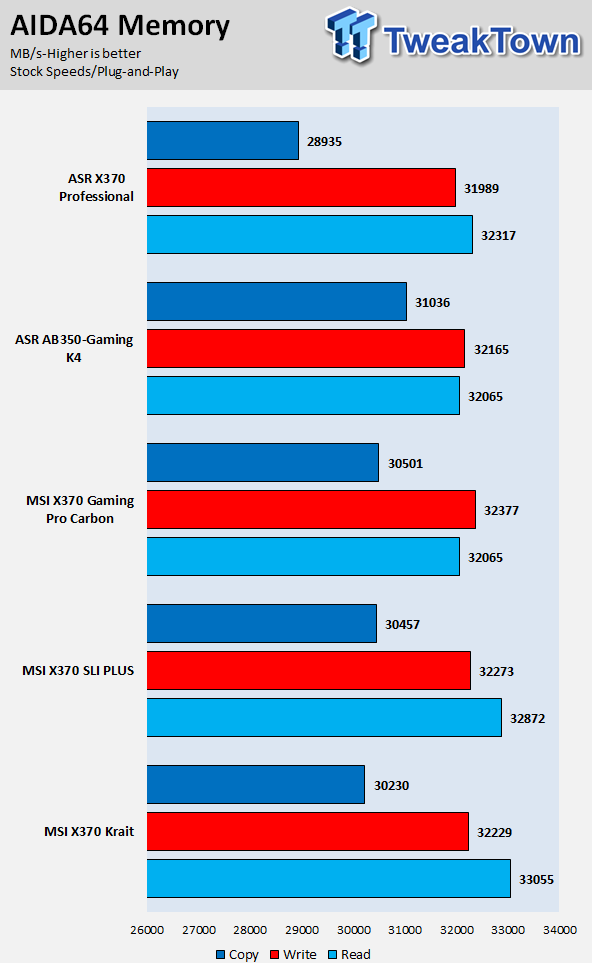
ScienceMark
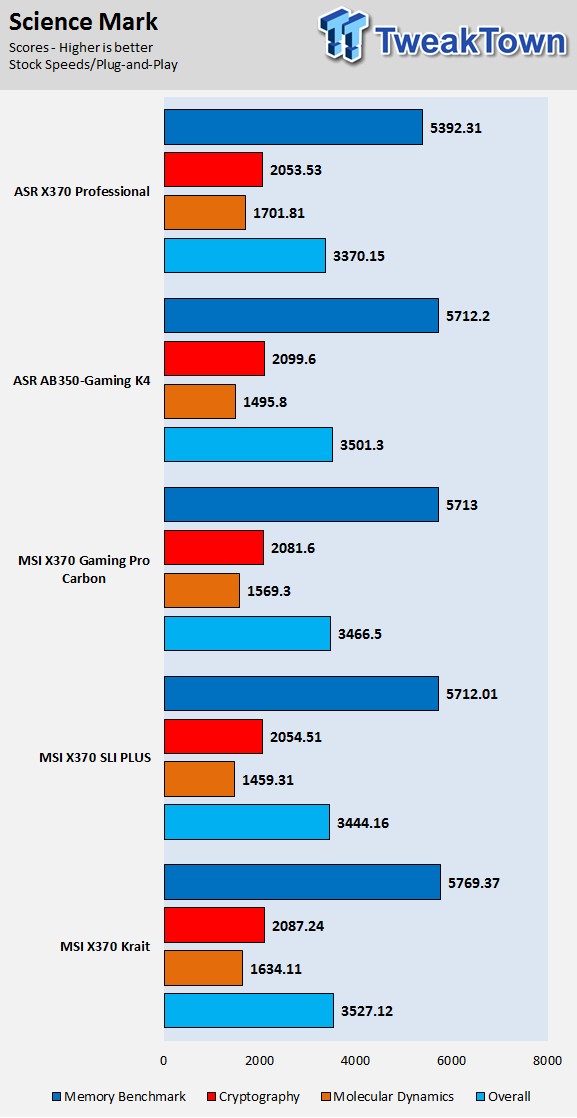
HandBrake
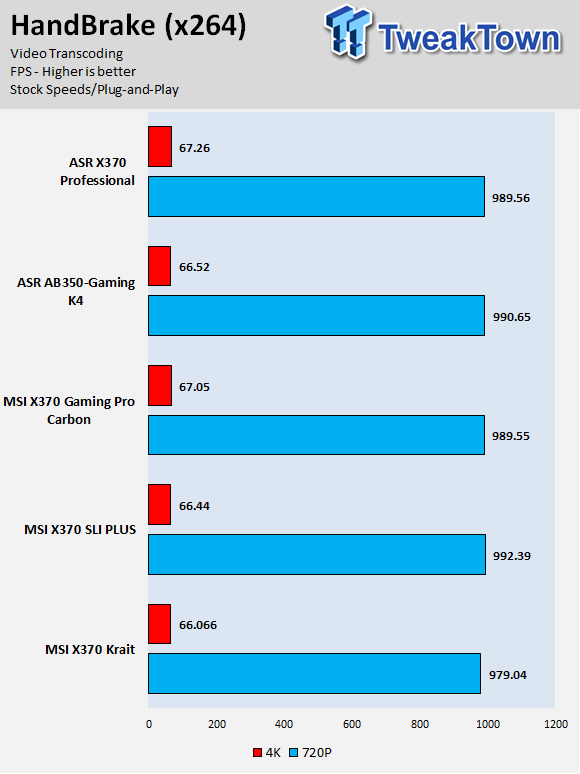
SuperPi 32M
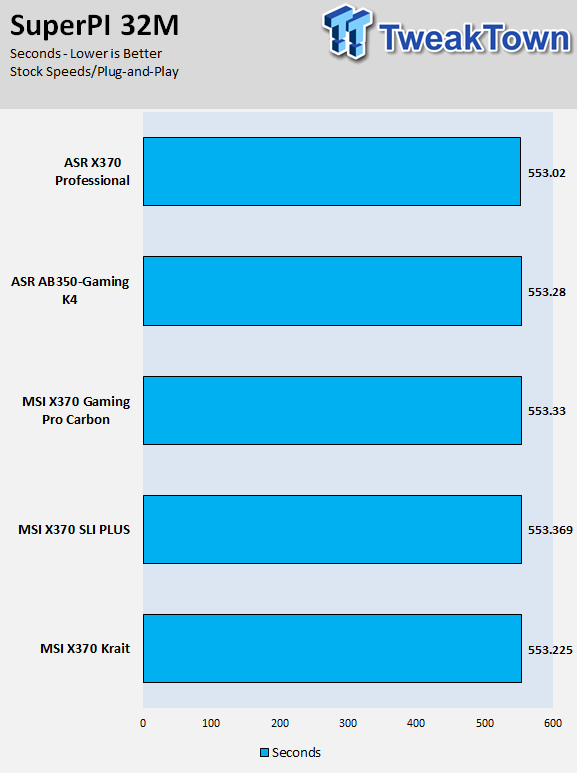
3DMark: Fire Strike
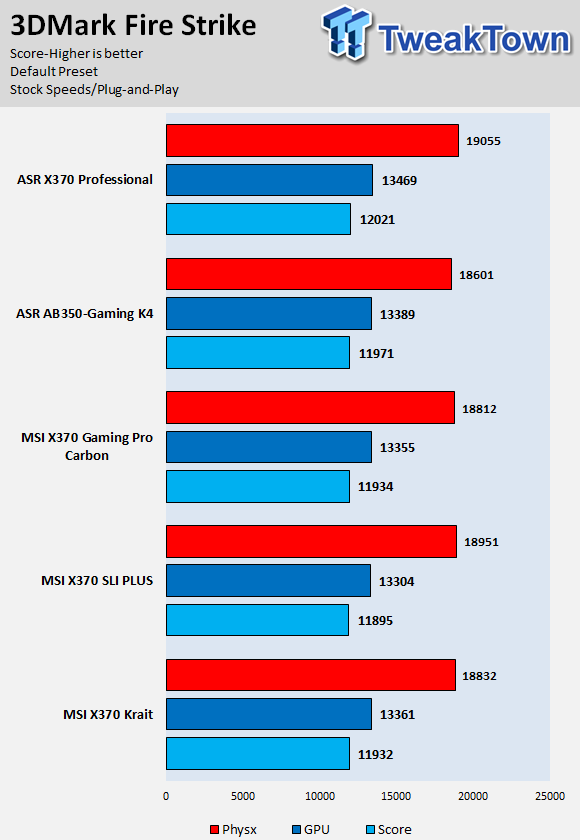
3DMark: Cloud Gate
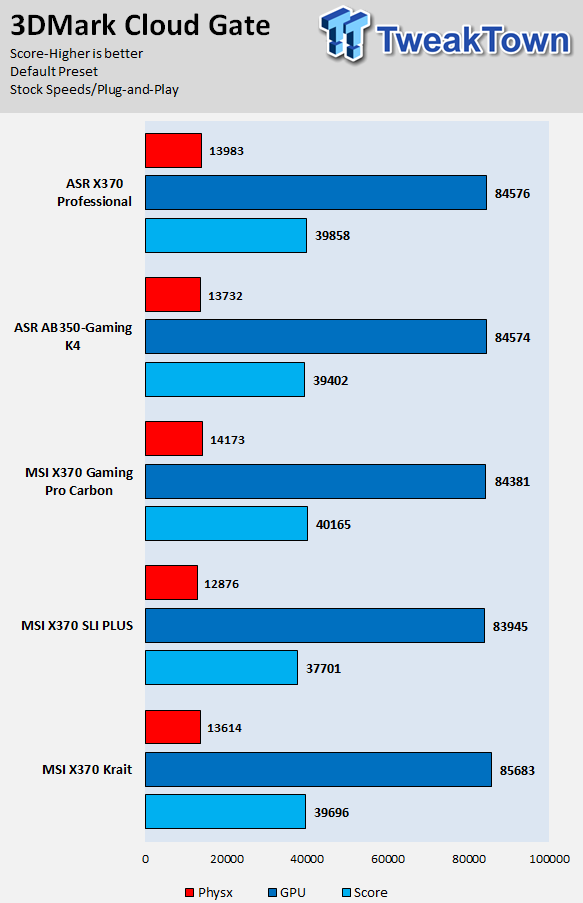
ResidentEvil 6
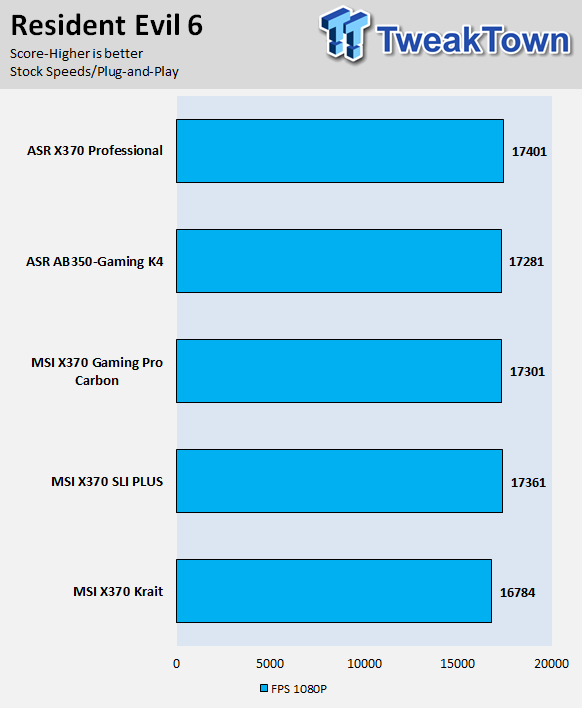
The X370 GAMING PRO CARBON's overall (CPU, memory, and gaming) performance is eerily similar to that of the other three motherboards I just tested. The top four motherboards are using newer (about a month newer) AEGIS BIOS microcode and do seem to perform a bit better than motherboards with the older microcode.
System IO Benchmarks
CrystalDiskMark SATA6G:
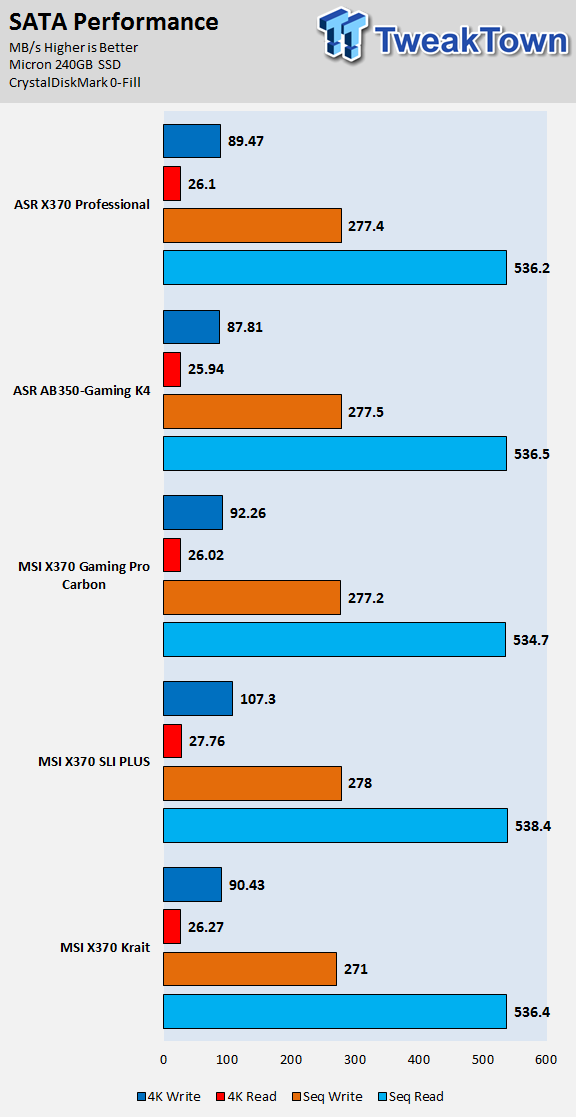
CrystalDiskMark M.2:
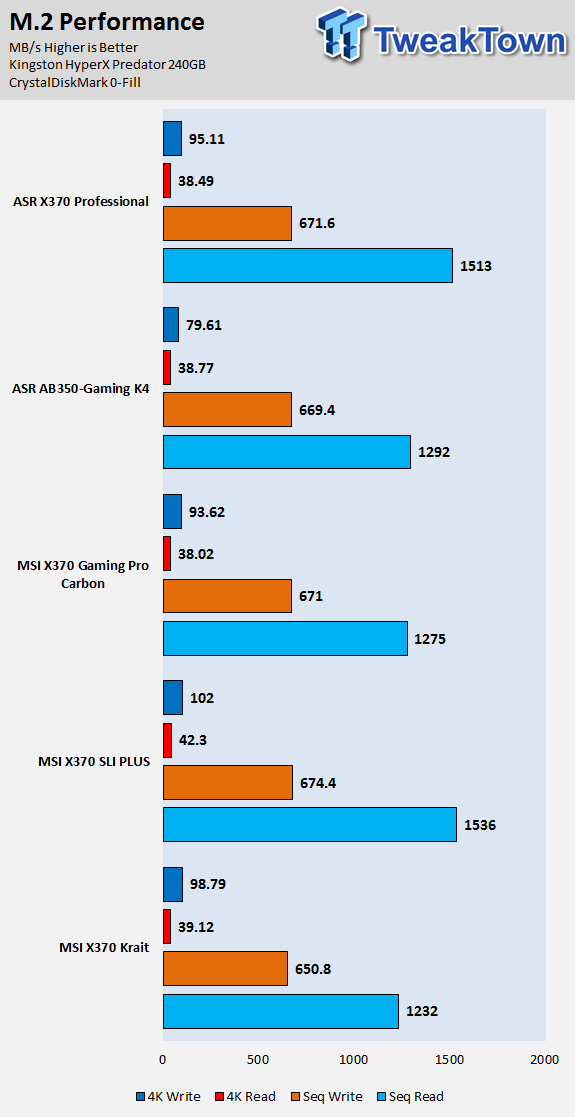
ixChariot Network Throughput:
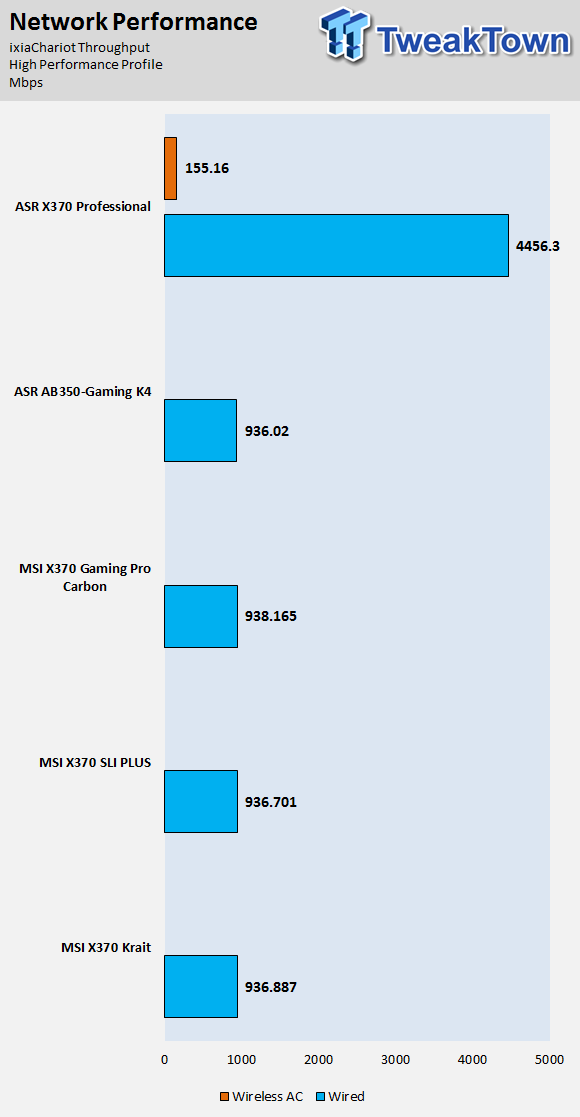
The X370 GAMING PRO CARBON's performance is decent in regards to storage, and we can see how the Intel NIC used on the motherboard offers slightly better performance than the Realtek used on the X370 SLI PLUS.
Audio RMAA 5.5:
I disable all audio features, set the correct bitrates, and then test the audio with a loopback test.
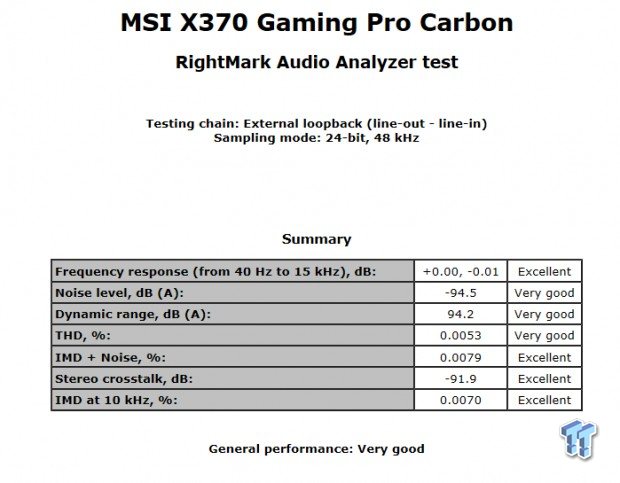
Sound Judgment by Ear: Very Good to Excellent. The audio solution used here is quite good, and MSI has implemented a decent amount of other hardware to improve audio quality. There are five ratings for audio: 1. Problems, 2. Okay, 3. Acceptable, 4. Very good, 5. Excellent
Thermal Imaging and Power Consumption
System power is measured at the wall with an AC power meter.
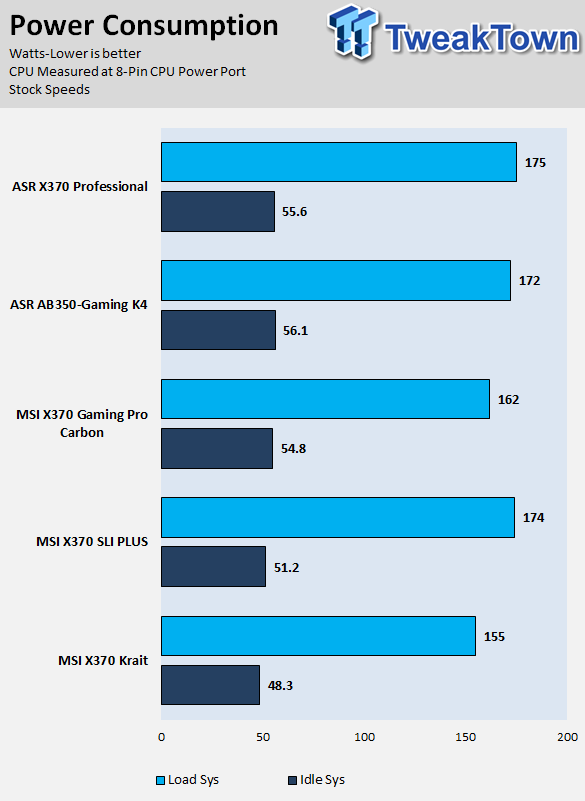
Note on Thermal Images: In the temperature section, we use our Seek thermal imaging camera to capture the surface temperatures of major components on the board. I look at the VRM and then all other things that light up the screen. If there is something to worry about, then I will state it. Otherwise, I will just show the hotter running parts of the board for fun. Unless some component is over 80-90C, then there isn't anything to worry about.
All systems will act differently, so I will look for commonalities, such as how far from the VRM the heat spreads through the PCB and the difference in temperature between the front side and backside of the PCB. Keep in mind, the majority of the heat from the VRM goes into the PCB as it is a giant soldered on copper heat sink. A larger difference in temperature between the back and front of the PCB points towards a more effective heat sink.
Thermal Testing at Stock Speeds:
The image on the left is always at idle, and the image on the right is at load. During ALL TESTS, fans above the VRM that cool the CPU cooler's (Corsair H110i) radiator are turned on to high (12v).
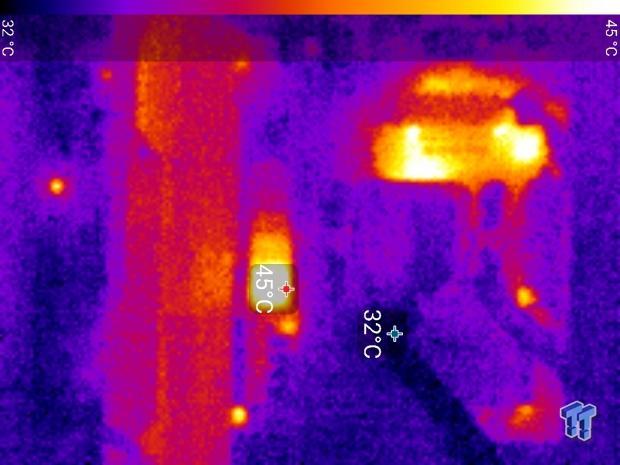
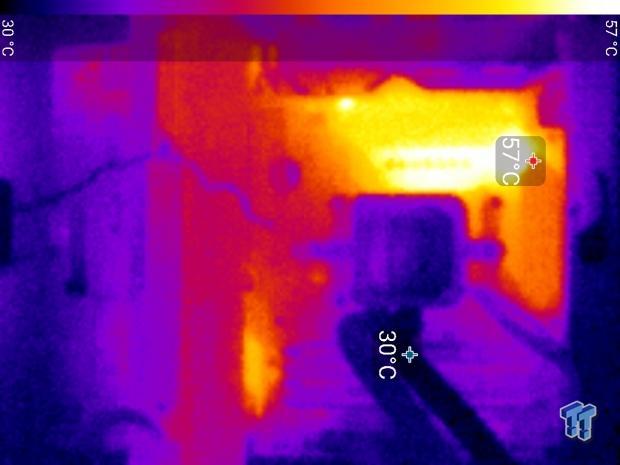
Full frontal.
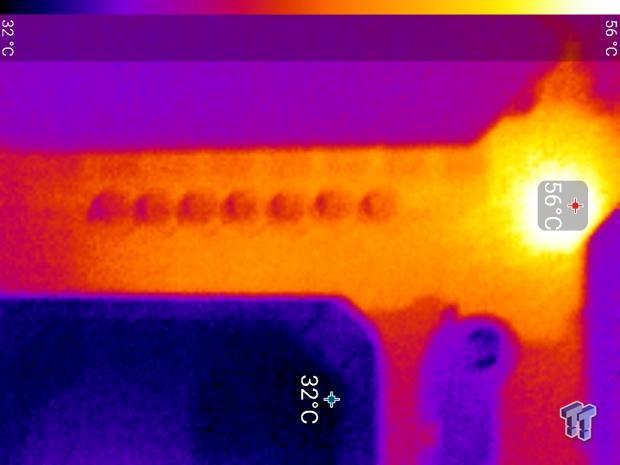
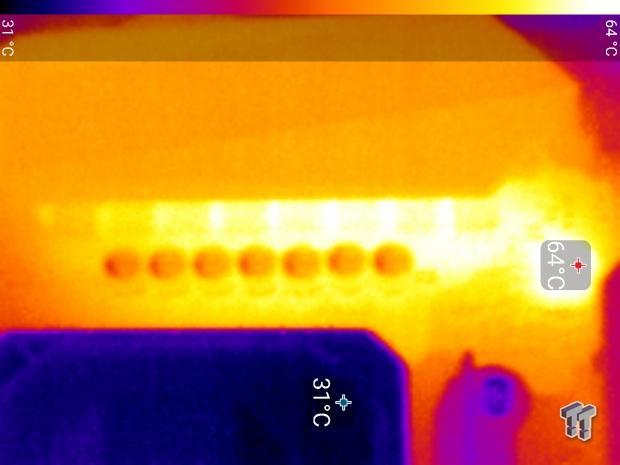
Up-close of the front of the VRM.
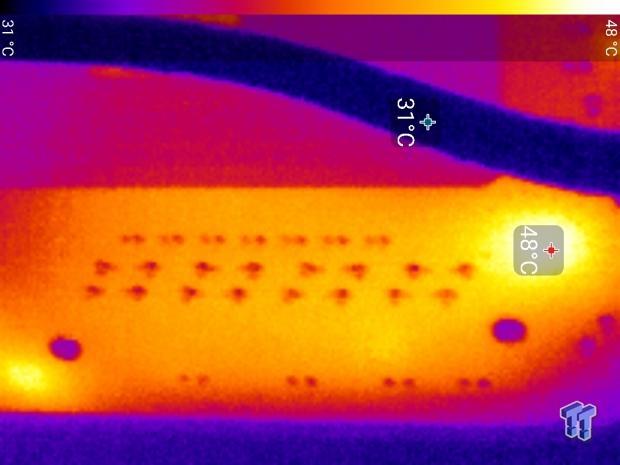
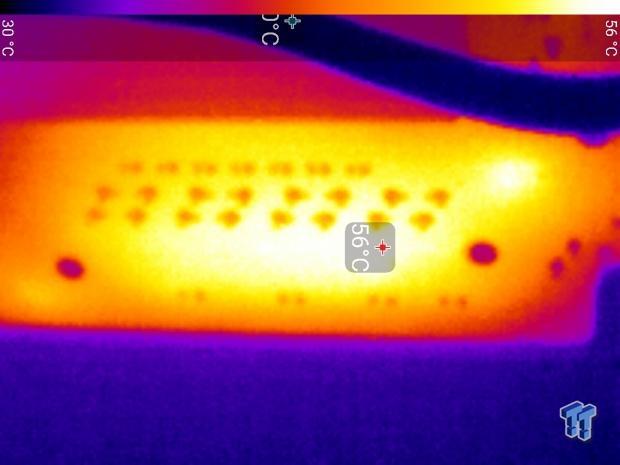
Up-close of the back of the VRM.
The X370 GAMING PRO CARBON's thermal performance is not that amazing, but the VRM gets the job done. I do not know why this new Richtek PWM gets so hot on its own, but it does seem to be designed to withstand the higher temperatures. The VRM components on this motherboard are identical to that of MSI motherboards that cost $50 less.
Anything under 60C is great, 60-80C is acceptable, and anything above 80C is a bit worrisome (if at stock).
What's Hot, What's Not & Final Thoughts
Here are key points about the MSI X370 GAMING PRO CARBON.
What's Hot
High-End Aesthetics: I didn't think the motherboard would look as good as it does in person, but MSI's designers deserve a round of applause for this product as the mixture of carbon fiber, blacked out PCB/heat sinks, and RGB LEDs go together quite well. The RGB LEDs built into the motherboard will allow you to customize its color, and their diffusion is excellent.
Dual M.2: Not many X370 motherboards feature two M.2 slots, but this one does. The top slot operates at 32Gb/s while the bottom one operates at 20Gb/s. While x4 PCI-E 3.0 (top slot) offers more bandwidth than x4 PCI-E 2.0 (bottom slot), both are capable of supporting high-speed drives.
Latest NIC and Codec: Many people will only buy motherboards with an Intel NIC, and while there are good alternatives, Intel's NICs offer consistent performance. The X370 GAMING PRO CARBON offers the latest Intel NIC, the i211AT. The audio on this motherboard comes from top notch components including the latest Realtek ALC1220, two Texas Instruments amplifiers, and Nichicon Gold series capacitors.
Dual Internal USB 3.0 and ASMedia USB 3.1: MSI has decided to provide two USB 3.0 internal headers on its latest X370 motherboards. Rear USB 3.1 type-A and type-C both come from ASMedia's latest controller, which should offer slightly better performance than AMD's native controller because of its distance from the rear ports.
What's Not
VRM Quality vs. Price: At this price point we did expect slightly better VRM quality. I will say that the VRM does get the job done, I can easily overclock to 4GHz, but I would have some active airflow in the VRM area for 24/7 full load use.
Final Thoughts
The MSI X370 GAMING PRO CARBON is a mid to high-end X370 motherboard in every sense. From its aesthetics to its features, it's a really great buy for someone who wants a high-end Ryzen experience at a fair price. My only issue with the motherboard is its VRM quality and lack of OC features; I expected slightly better in this price bracket. Needless to say, the VRM gets the job done and doesn't hinder overall overclocking capabilities.

The X370 GAMING PRO CARBON also looks quite impressive, and while some people might not care about how their motherboard looks, I and many others do as well. Many of you had asked me to review this motherboard, presumably because it is on your list for potential builds. I am happy to say I approve of this product; it's a solid motherboard with a healthy serving of features and aesthetics.

| Performance | 89% |
| Quality | 90% |
| Features | 99% |
| Value | 90% |
| Overall | 92% |
The Bottom Line: Dual M.2 slots, high-end audio, Intel NIC, and crazy RGB LED support are only some of the loaded features that the MSI X370 GAMING PRO CARBON has to offer.
PRICING: You can find products similar to this one for sale below.
 United
States: Find other tech and computer products like this
over at Amazon.com
United
States: Find other tech and computer products like this
over at Amazon.com
 United
Kingdom: Find other tech and computer products like this
over at Amazon.co.uk
United
Kingdom: Find other tech and computer products like this
over at Amazon.co.uk
 Australia:
Find other tech and computer products like this over at Amazon.com.au
Australia:
Find other tech and computer products like this over at Amazon.com.au
 Canada:
Find other tech and computer products like this over at Amazon.ca
Canada:
Find other tech and computer products like this over at Amazon.ca
 Deutschland:
Finde andere Technik- und Computerprodukte wie dieses auf Amazon.de
Deutschland:
Finde andere Technik- und Computerprodukte wie dieses auf Amazon.de
Related Tags
